
Les yeux sans visage, le film de 1960
- Détails
- Écrit par David Sicé
- Catégorie : Blog
- Affichages : 3403
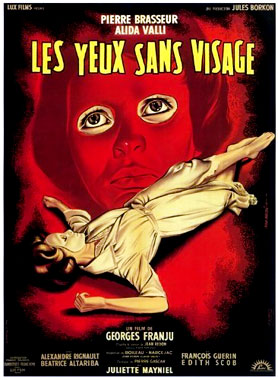

Les yeux sans visage (1960)
Titre anglais : Eyes Without A Face.
Sorti en France le 11 janvier 1960.
Sorti aux USA le 24 octobre 1962.
Sorti en blu-ray français le 2 novembre 2010 (illisible sur les anciens lecteurs non à jour, français DTS HD MA mono).
Sorti en blu-ray américain le 15 octobre 2013 chez CRITERION (région A, son français LPCM mono, incompressé, nombreux bonus)
De Georges Franju, sur un scénario de Pierre Boileau, Thomas Narcejac (Boileau-Narcejac), Claude Sautet, Pierre Gascar ; d'après le roman de Jean Redon (également scénariste) ; avec Pierre Brasseur, Alida Valli, Edith Scob, Alexandre Rignault, Michel Etcheverry, François Guérin, Juliette Mayniel.
Pour adultes et adolescents.
Une femme roule à vive allure dans la nuit, avec un passager apparemment assoupi sur le siège arrière, en gabardine et le visage dissimulé par des grosses lunettes noires et un chapeau. La femme, visiblement inquiète, se range pour laisser passer un camion, puis reprend sa route jusqu’au bord d’une rivière. Elle descend, vérifie que personne ne l’observe, puis tire le corps hors de sa voiture jusqu’à la rivière – une jeune femme aux jambes et pieds nus, qu’elle jette dans l’eau. Puis elle s’éloigne rapidement.
Le professeur Genessier fait une conférence sur l’hétéro-greffe, c’est-à-dire la greffe de tissus vivants d’un individu sur un autre, dans un salon devant peut-être deux cents personnes attentives. X expose les techniques toutes aussi atroces les unes que les autres pour tenter d’éviter le rejet de la greffe. Malgré les compliments du public, le professeur quitte rapidement les lieux, et l’une des femmes fait remarquer que le professeur a beaucoup changé depuis la disparition de sa fille, et fait des réflexions bizarres.
Le bureau du médecin légiste : le légiste, le docteur Lherminier, admet que l’hypothèse de l’inspecteur Parot du Service des Recherches dans l’intérêt des familles, selon laquelle la jeune noyée au visage profondément détruit pourrait être la fille du professeur Genessier. Mais ils ont des doutes : le signalement correspond aussi à celui d’une autre jeune fille disparue, Monique Tessot ; la noyée était nue sous un manteau d’homme et il est curieux quand on veut se suicider en plein hiver de commencer par quitter ses vêtements ; par ailleurs, la plaie au visage a des contours trop réguliers, comme si elle avait été faite au scalpel.
C’est précisément auprès de Lherminier et Parot que le professeur Genessier se rendait si rapidement après sa conférence. Après avoir fait les présentations, les deux hommes conduisent le professeur auprès du cadavre, et Genessier reconnait sa fille Christiane. C’est alors qu’on frappe à la porte : Henri Tessot, le père d’une autre disparue, se présente pour reconnaître sa fille, mais Lherminier ordonne que Tessot soit remercié, puisque Genessier a formellement reconnu le cadavre.
Lorsqu’il sort de la morgue, Genessier est abordé par Henri Tessot, qui lui demande s’il est bien sûr que la noyée est sa fille. Genessier répond que oui, et Tessot est très ému. Alors Genessier fait froidement remarquer qu’il trouve curieux d’avoir à réconforter Tessot alors qu’à lui, il lui reste un espoir.
Non loin d’une université, à Paris, la femme qui avait jeté la jeune fille à la Seine, et qui n’est autre que Louise, la secrétaire du professeur Genessier traîne près d’une bouquinerie : elle suit discrètement une autre jeune fille, à la recherche d’une chambre.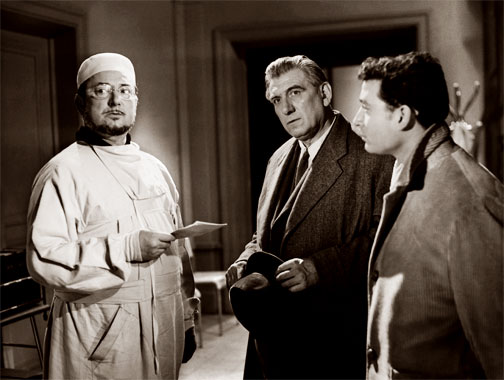
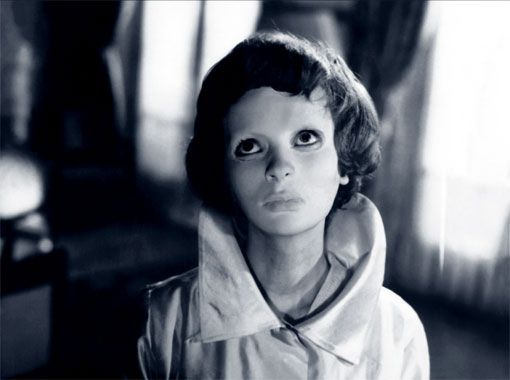
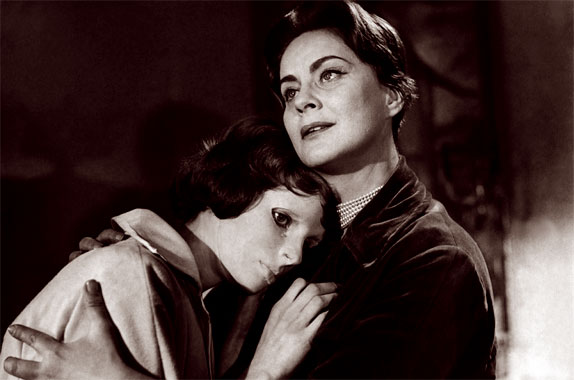
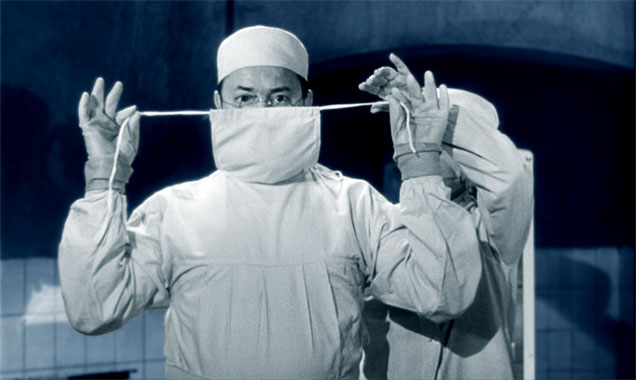
***
Donnez votre avis sur ce film en nous rejoignant sur le forum Philippe-Ebly.fr
***
La quatrième dimension S01E14: Troisième à partir du Soleil (1960)
- Détails
- Écrit par David Sicé
- Catégorie : Blog
- Affichages : 2882
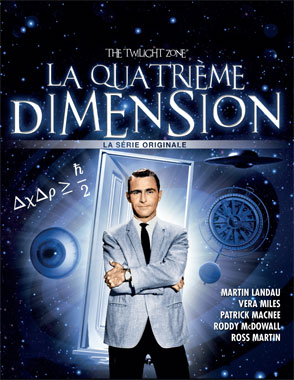

The Twilight Zone S01E14: Third From The Sun (1959)
Traduction du titre original: La troisième à partir du Soleil.
Épisode précédent <> Épisode suivant.
Ici l'article de ce blog sur la série La quatrième dimension (1959)
Diffusé aux USA le 8 janvier 1960 sur CBS US.
Diffusé en France le 2 février 1985 sur TF1 FR.
Sortie en blu-ray américain de la saison 1 le 14 septembre 2010 (région A seulement).
Sorti en blu-ray français de la saison 1 le 25 octobre 2011 (région B seulement, plus compressé que l'américain, bonus manquants).
De Rod Sterling (également scénariste), d'après la nouvelle de Richard Matheson ; réalisé par Richard L. Bare ; avec Fritz Weaver, Edward Andrews, Joe Maross, Denise Alexander, Lori March, Jeanne Evans.
Pour adultes et adolescents.
Le soir, la sortie des employés d’une usine par la porte sécurisé numéro 22. Parkinson, département des armes chimiques ; Amberley, département des armes à hydrogène ; Mills, département des armes bactériologiques ; Sturka, département des armes à hydrogène – tous sont contrôlés, et le policier fait remarquer à Sturka que son département est particulièrement occupé en ce moment, ce que Sturka confirme laconiquement.
Sturka s’en va immédiatement allumer une cigarette, et il est rejoint par un autre homme, Carling, qui lui demande de garder son briquet allumé, le temps qu’il allume sa propre cigarette. Carling lui fait remarquer que les journées sont longues, ce que Sturka confirme, l’air surpris. Pour Carling, c’est l’éclate totale pour le département des armes à hydrogène : cela va arriver, pour de vrai, et ce sera d’envergure. Et il parie qu’au moment même où ils ont cette conversation, l’armée est en train de tout mettre en place – il parie qu’ils ont tout prévu, et on dit que cela arrivera dans 48 heures. Que Sturka attende et il verra que Carling a raison : dans 48 heures, et l’armée aura décollé, puis woosh, là-haut, en place et boum, l’Ennemi sera anéanti, achevé.
Alors Sturka demande ce que l’Ennemi fait pendant ce temps-là. Carling répond qu’ils préparent probablement leur riposte du mieux qu’ils le peuvent, mais c’est une grande perte de temps : une fois que leur pays aura frappé le premier, les autres ne pourront plus faire grand-chose. Sturka objecte que l’Ennemi pourrait aller eux aussi faire woosh, là-haut, en place et boum. Carling concède que cela est parfaitement possible, mais pas avec autant de ressources, ni aussi précisément visé, ni aussi talentueusement porté. Sturka répond que donc, au lieu de perdre 50 millions de personnes, ils n’en perdront que 35. Carling demande alors à Sturka s’il est un défaitiste, car c’est une manière de penser dangereuse et Sturka ferait mieux de faire attention à ce qu’il dit. Sturka ajoute avec ironie qu’il devrait aussi faire attention à ce qu’il pense. Carling le confirme. Sur ces mots, Sturka souhaite une bonne nuit à Carling et lui donne rendez-vous au lendemain.
Il est temps de dîner désormais, de passer du temps avec sa famille, de se rafraîchir en prenant un verre sur le porche de sa maison, de se distraire du froissement des feuilles des arbres de l’allée, qui font de l’ombre à la Lune, et dessous tout cela, caché des yeux des humains, invisible dans la nuit d’été, l’horreur indicible – car cela n’est que le calme avant une tempête : c’est la veille de la fin du monde.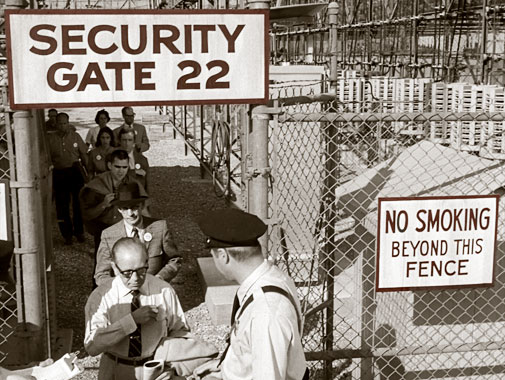
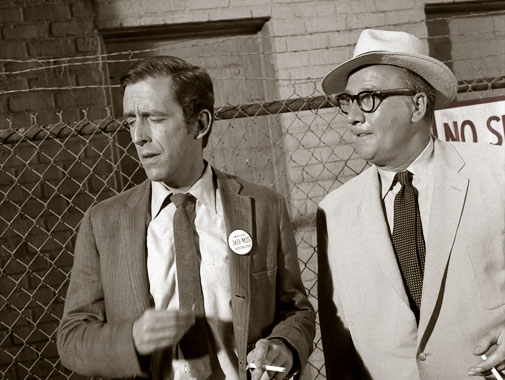
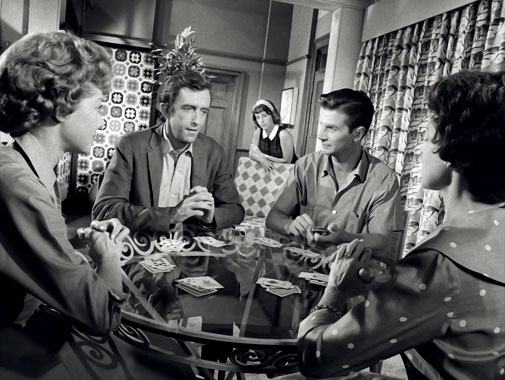
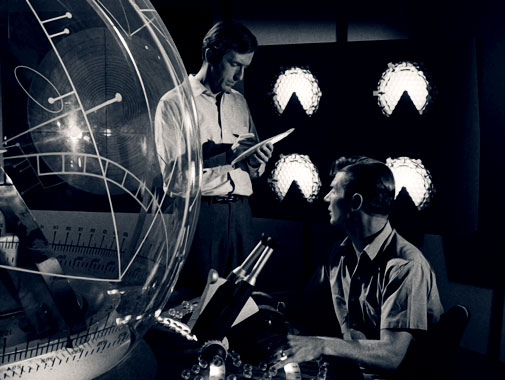
***
Donnez votre avis sur cet épisode en nous rejoignant sur le forum Philippe-Ebly.fr
***
Calendrier cinéma 1959
- Détails
- Écrit par David Sicé
- Catégorie : Blog
- Affichages : 3030

Voici la liste des articles de ce blog consacrés aux films de Science-fiction, Fantasy, Fantastique et Aventure annoncé pour l'année 1959. Cette liste sera mise à jour au fur et à mesure de la rédaction des articles.
Ici le calendrier cinéma pour 1960.
Ici le calendrier cinéma pour 1958.
***

Décembre 1959
Aux USA
Le dernier rivage (11 décembre 1959, On The Beach)
Voyage au centre de la Terre (16 décembre, Journey to The Center Of The Earth)
***
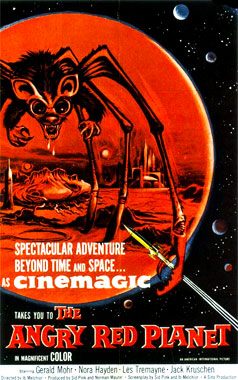
Novembre 1959
Aux USA
***

Juillet 1959
En France
Le tombeau hindou (22 juillet, Der Tiger von Eschnapur)
***

Mai 1959
En France
La mouche noir (13 mai, The Fly)
***
Avril 1959
En France
The Trollenberg Terror (7 avril 1959, The Crawling Eye)
***

Janvier 1959
En Angleterre
Le septième voyage de Sinbad 1958 (18 janvier 1959, The 7th Voyage of Sinbad)
En Allemagne
Le tombeau hindou (22 janvier, Der Tiger von Eschnapur)
***
La quatrième dimension S01E13: Quatre d'entre nous sont mourants (1960)
- Détails
- Écrit par David Sicé
- Catégorie : Blog
- Affichages : 2734


The Twilight Zone S01E13: The Four Of Us Are Dying (1960)
Traduction du titre original: Nous sommes quatre à mourir.
Épisode précédent <> Épisode suivant.
Ici l'article de ce blog sur la série La quatrième dimension (1959)
Diffusé aux USA le 1er janvier 1960 sur CBS US.
Diffusé en France le 23 juillet 1988 sur TF1 FR.
Sortie en blu-ray américain de la saison 1 le 14 septembre 2010 (région A seulement).
Sorti en blu-ray français de la saison 1 le 25 octobre 2011 (région B seulement, plus compressé que l'américain, bonus manquants).
De Rod Sterling (également scénariste), d'après la nouvelle de George Clayton Johnson ; réalisé par John Brahm ; avec Harry Townes, Phillip Pine, Ross Martin, Don Gordon, Harry Jackson, Bernard Fein, Peter Brocco, Milton Frome, Beverly Garland.
Pour adultes et adolescents.
La ville de nuit, le quartier des boites de nuit. Arch Hammer descend à l’hôtel Real (« réel »). Hammer a 36 ans, il a été vendeur à domicile, livreur, un conducteur de camion, un escroc, un bookmaker, et un barman à mi-temps. C’est un homme minable, le genre à dépendre d’une différence de prix de 5 ou 10 centimes. Et son manque de valeur dépasse le faible prix de son costume et de sa chemise – son esprit est minable, ses goûts sont minable, sa conscience se limite à une sordide lueur jamais touchée par la lumière tant sa vision est obtuse.
Mais M. Hammer a un talent qu’il s’est découvert très jeune. Il a au moins cela : il peut faire changer son visage. Il peut distorde un muscle, déplacer une mâchoire, se concentrer sur son regard – et il peut changer son visage, il peut lui donner tous les traits qu’il veut. M. Archie Hammer, touche-à-tout, vient juste de signer le registre d’un hôtel à 3$80 la nuit, avec deux valises, quelques coupures de presse avec la photo de gens assassinés par des gangs ou accidentés, le talent le plus bizarre, et une combine pour détruire quelques vies.
Hammer s’étant rasé et rhabillé, il pioche sur le lit la coupure de presse sur un certain John Foster, musicien, tué en traversant une voie ferrée. Souriant, il sort de sa chambre, et va déambuler dans le quartier et entre dans un club de Jazz enfumé où Maggie, une chanteuse mélancolique chante l’alcool avec beaucoup de conviction. Comme un client attrape Maggie par la taille à la sortie de son tour de chant, celle-ci refuse le verre en sa compagnie, préférant en prendre un toute seule à une table plus loin. À peine assise, elle reste stupéfaite alors que John Foster vient s’asseoir à sa table…
***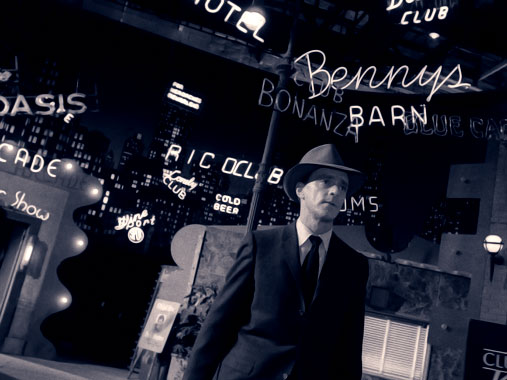
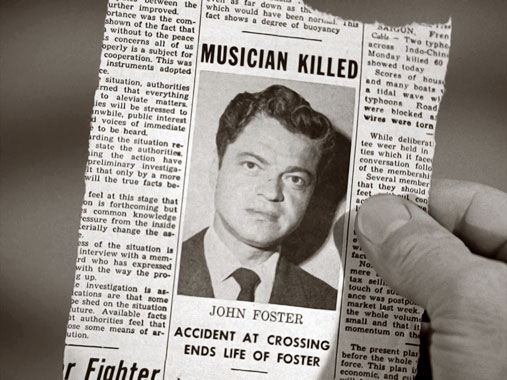
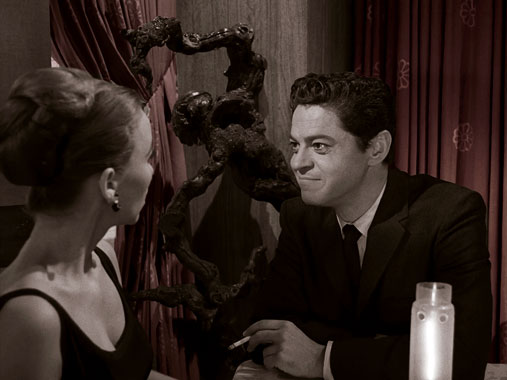
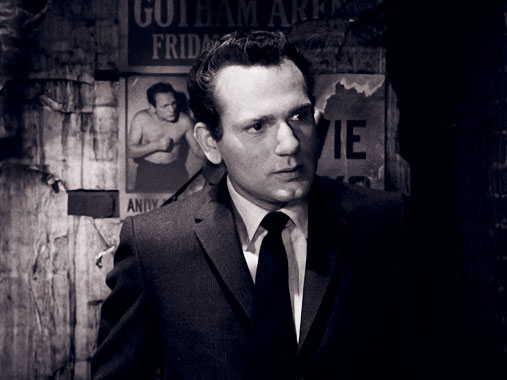
***
Donnez votre avis sur cet épisode en nous rejoignant sur le forum Philippe-Ebly.fr
***
La Quatrième dimension S01E12: Je sais ce qu'il vous faut (1959)
- Détails
- Écrit par David Sicé
- Catégorie : Blog
- Affichages : 2981


Ici la page Amazon.fr du blu-ray français de la saison 1 de la Quatrième dimension (1959)
The Twilight Zone S01E12: What You Need (1959)
Traduction du titre original: Ce qu'il vous faut.
Épisode précédent <> Épisode suivant.
Ici l'article de ce blog sur la série La quatrième dimension (1959)
Diffusé aux USA le 25 décembre 1959 sur CBS US.
Diffusé en France le 31 juillet 1965 sur ORTF 1 FR.
Sortie en blu-ray américain de la saison 1 le 14 septembre 2010 (région A seulement).
Sorti en blu-ray français de la saison 1 le 25 octobre 2011 (région B seulement, plus compressé que l'américain, bonus manquants).
De Rod Sterling (également scénariste), d'après la nouvelle de Henry Kuttner et C.L. Moore (Lewis Padgett) ; réalisé par Alvin Ganzer ; avec Steve Cochran, Ernest Truex, Read Morgan, William Edmonson, Doris Karnes.
Pour adultes et adolescents.
Résumé à venir.
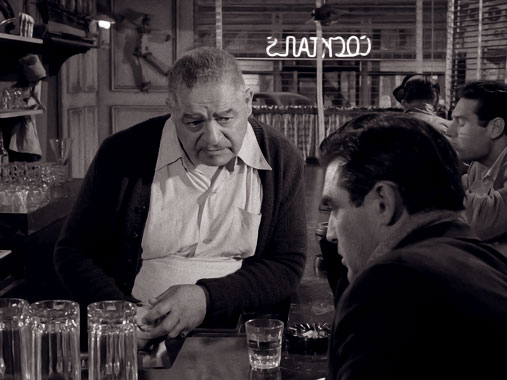
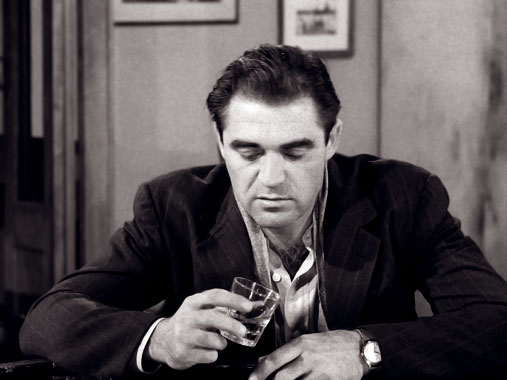
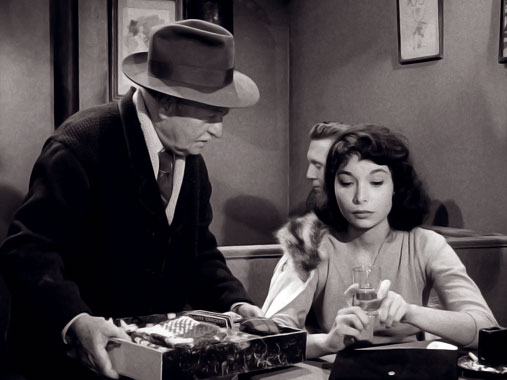
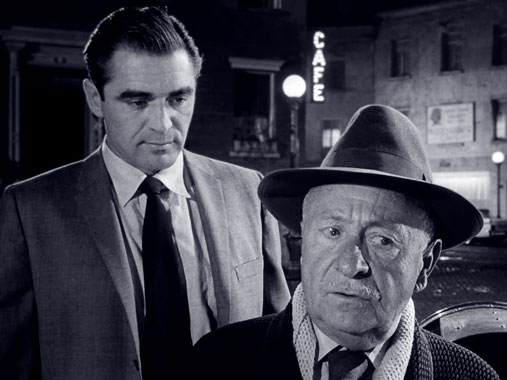
***

